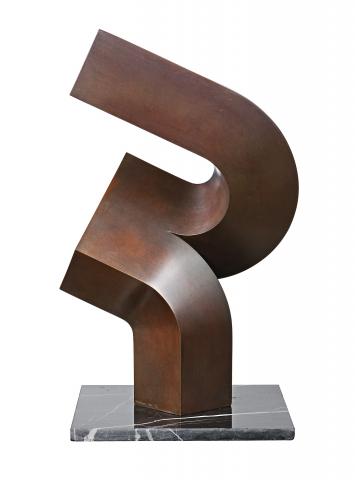UPSWING, 1980
CLEMENT MEADMORE
bronze
54.0 cm height
signed, dated and numbered at base: Meadmore 1980 2/6
David Barnett Gallery, Milwaukee, USA
Private collection, Melbourne, acquired from the above early 1980s
Upswing, 1980, bronze, 457.0 cm height, collection of Mr and Mrs Leonard Luria, Miami, Florida, in Gibson, E., The Sculpture of Clement Meadmore, Hudson Hills Press, New York, 1994, p. 104 (illus.)
The power in Clement Meadmore’s sculpture resides in the intriguing paradox it presents to the viewer. It is at once a fixed and solid form yet also a gestural force pushing into space and rearranging it in a dynamic fluid movement. His work emanates a robust physicality and yet an ethereal quality is equally evident. The ideas his sculpture embody tip between gravitas and whimsy, so often seen in Meadmore’s irreverent play on words with titles such as Upstart, Fling and in the case of this piece, Upswing, 1980. In fact, while we first turn our minds to monumental archetypes when considering his work, many of Meadmore’s conceptions are born from jazz, which was a constant muse in his studio while he worked. The monumental Upswing in the Miami garden of Mr and Mrs Leonard Luria latently refers to jazz improvisations and may well have its genesis in musical notations. It is one of the more gestural examples of his work, playfully moving a solid form up into space, seemingly counter to the laws of gravity.
Meadmore departed Australia to take up residence in New York in 1963 and here a seminal shift occurred in his work. At the suggestion of Canadian sculptor Robert Murray, he relinquished the encrusted texture from his work and began to create the pure honed surfaces for which he has become renowned. During the first years in New York a grounded cubist quality was evident in his sculpture. However, by the mid-sixties a heavy condensed curve had arrived, which he eventually liberated into an articulated curl. In fact, the monolithic 12 foot steel installation at Columbia University titled Curl represents the emergence of his most highly regarded form – the three-dimensional line in space. It is a form that has at once a lightness and yet a solidity. Dervish in the collection of the Victorian Arts Centre, Melbourne and now installed along the river at Southgate is a further example of this period. Upswing is from a more evolved series again and is closely related to Branching Out 1980 in the gardens of the Cleveland Museum of Art and Crescendo 1989 in the forecourt of the Metropolitan Art Space, Tokyo.
